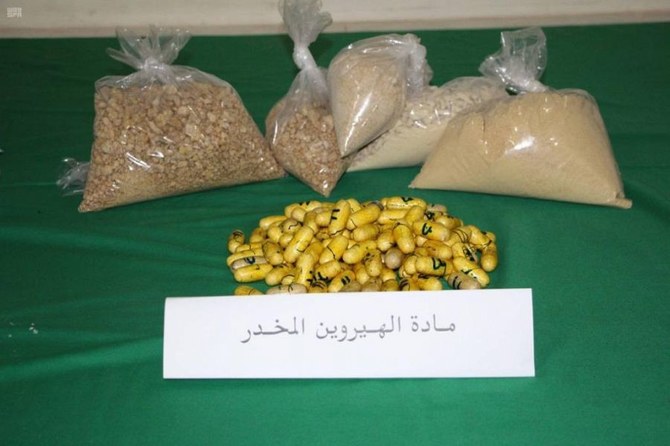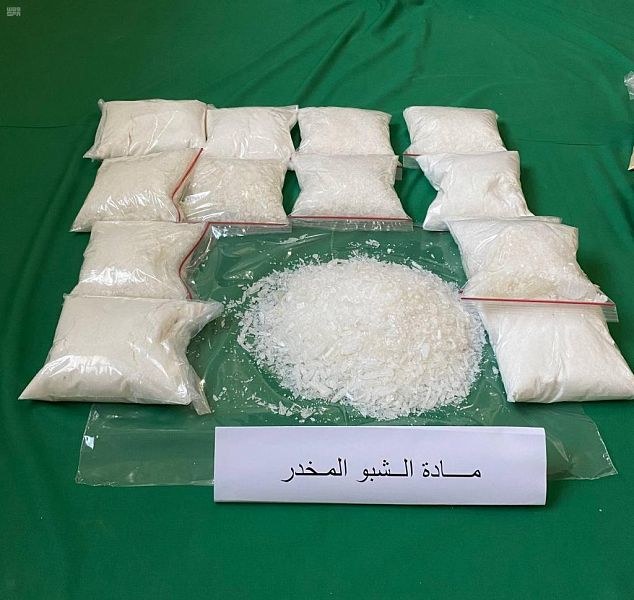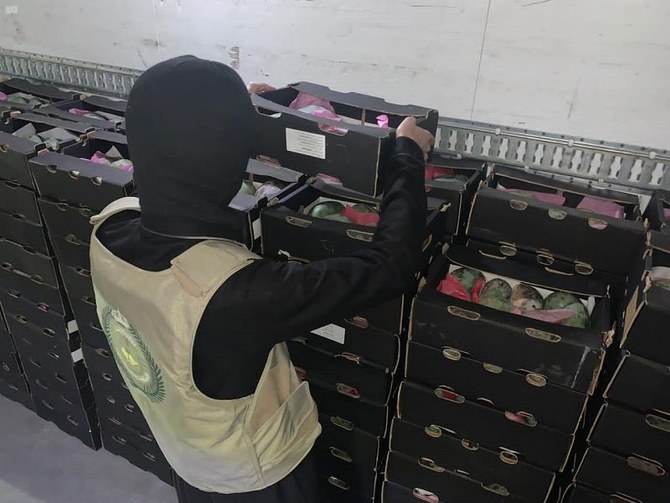RIYADH: Saudi authorities announced that they have foiled attempts to smuggle large quantities of amphetamine pills, methamphetamine and heroin into the Kingdom, Saudi Press Agency reported.
Capt. Mohammed bin Khaled Al-Najidi, spokesperson for the General Directorate for Narcotics Control, said security officials monitoring activities of criminal networks “thwarted the attempts to smuggle and distribute (the) drugs” in two separate operations.
The spokesperson said that officers broke up a criminal cell in the capital, Riyadh, and arrested its members, including a Saudi citizen and a foreign resident. More than 4.4 million amphetamine tablets were found hidden inside a mango shipment.
In another operation, three residents were arrested in the Eastern Province and 10.68 kg of methamphetamine and five kg of heroin were seized.
Al-Najidi said that legal action has been taken against the five individuals who were arrested.
Saudi authorities thwart amphetamine, heroin smuggling rings
https://arab.news/vqhmj
Saudi authorities thwart amphetamine, heroin smuggling rings

- Officials seized the drugs in two separate operations
- Over 4.4m amphetamine pills, more than 10kg methamphetamine, 5kg of heroin were seized
Strict security in Makkah targets Hajj violations

- Ministry of Interior reminded the public that entering Makkah without a Hajj permit from April 29 to June 10 is prohibited. (@makkahregion)
MAKKAH: Security patrols in Makkah arrested two Indonesian residents for fraud after they posted deceptive social media ads for fake Hajj campaigns, falsely promising accommodation and transportation within the holy sites.
In a separate case, Makkah police arrested two Kyrgyz residents for posting fraudulent ads targeting visit visa holders, misleading them into believing they could perform Hajj without a permit.
The suspects transported 87 visa holders and housed them in two rented locations in Makkah for a fee, the Saudi Press Agency reported on Sunday.
Legal action has been taken against them, and they have been referred to the Public Prosecution. The visa violators were also referred to the relevant authorities for legal penalties.
The General Directorate of Public Security urged all citizens and residents to follow Hajj regulations and report violations by calling 911 in Makkah, Riyadh, Madinah, and the Eastern Province, or 999 in other regions.
Hajj Security Forces at Makkah’s entrances also arrested seven residents and eight citizens for transporting 61 individuals without Hajj permits, according to the SPA.
The Ministry of Interior issued administrative decisions against the transporters, accomplices, and those transported.
Penalties include imprisonment, fines of up to SR100,000 ($26,600), public naming, deportation of residents, and a 10-year re-entry ban after sentencing.
The ministry also called for the confiscation of vehicles used in unauthorized transport and fines of up to SR20,000 for those attempting to perform Hajj without a permit.
It urged full compliance with Hajj regulations to ensure pilgrim safety and reminded the public that entering Makkah without a Hajj permit from April 29 to June 10 is prohibited.
Food and drug checks intensify ahead of Hajj

RIYADH: The Saudi Food and Drug Authority is continuing its proactive inspection campaigns as part of preparations for the Hajj season.
The authority has conducted more than 1,329 field visits to food, medicine and medical device warehouses in Makkah and Madinah so far.
These ongoing inspections and awareness efforts have led to a notable increase in compliance among facilities storing food and medicine for pilgrims, the Saudi Press Agency reported.
During the visits, inspection teams identified several warehouses that breached approved technical requirements and took the necessary legal actions.
As a result, 44 warehouses were closed, and 349 violations were recorded, according to the SPA.
To raise awareness, the authority launched a multilingual campaign that includes brochures outlining key product-handling requirements. It aims to improve safety and compliance at all facilities serving pilgrims.
The authority intensifies efforts each Hajj season to ensure food, medicine, and medical products meet safety standards, helping minimize health risks and protect pilgrims’ well-being.
KSrelief sends vaccine to Syrian pilgrims for Hajj

RIYADH: The Saudi aid agency KSrelief has provided 25,000 doses of the meningitis vaccine to Syrian pilgrims at the request of the Syrian Ministry of Health.
The vaccines are being administered in preparation for the pilgrims’ upcoming Hajj journey to the holy sites of Makkah and Madinah, the Saudi Press Agency reported.
The ministry of the Syrian Arab Republic expressed its appreciation for the prompt response, describing the support as characteristic of Saudi Arabia and its leadership.
Through KSrelief, the Kingdom has consistently provided vital aid to the Syrian people while addressing their most urgent needs, the SPA added.
This support highlights Saudi Arabia’s continued commitment to assisting nations and communities worldwide with critical medical supplies.
KSrelief recently concluded seven medical projects in Damascus as part of the Saudi Amal Volunteer Program.
The week-long initiatives included cardiac surgery and catheterization, orthopedics and joint surgery, prosthetics and rehabilitation, pediatric surgery, pediatric urology, and treatment for blindness and related conditions.
AlUla’s rawi historians tell tales as old as time

- Storytellers keep oral tradition alive by guiding tourists in ancient city
- Reciters of poetry tell the stories of historic sites
JEDDAH: In the timeless landscape of AlUla, stories are not only carved or marked into rock — they are carried in the hearts and voices of its people.
Among those preserving and sharing memories is Aljawharah Ibrahim Abdulkarim, a rawi — or oral storyteller — in the heritage, culture and events department at the Royal Commission for AlUla.
She told Arab News: “Several years ago I took a number of tour guiding courses and decided to pursue a career in this field. I was born and raised in AlUla, so I grew up hearing stories and learning about AlUla Old Town from my parents and relatives who lived there, which allowed me to better understand the history of the site.”
Storytelling for Abdulkarim is not just a job, but a mission. As a native of AlUla, she offers a rare blend of authenticity and academic insight, which she weaves into the tours she leads.
She added: “Since I’ve lived in AlUla my entire life, I’ve witnessed its amazing transformation over the years. Through my work as a rawi I’ve also seen firsthand the exciting future that lies ahead for this unique place. All of these experiences have helped enrich my personal story of AlUla.”
The rawi has historically played an important role in Arab culture, serving as a reciter of poetry and stories.
A trilingual speaker — fluent in her native Arabic, as well as in English and French — Abdulkarim represents the next generation of rawis that will show, and tell, the tales of their ancestors.
She said: “I first started learning English in AlUla. Later, I had the opportunity to travel to France on an RCU scholarship created especially for AlUla students. While there I learned French and obtained my master’s degree in international hospitality management.”
Her ability to connect with international visitors became a key asset, and she added: “The fact that I am a trilingual rawi helps me to better understand the different tourists that come to AlUla, offer more personalized responses to their questions, and share with them the special story of AlUla.
“I’ve also had the chance to represent AlUla and my colleagues across several conferences and campaigns in the Kingdom and globally, connecting me with an even broader audience.”
While much research has been devoted to ancient sites like Dadan and Hegra, Abdulkarim is passionate about shedding light on AlUla — especially the human stories of AlUla’s Old Town.
She said: “There is a lot of available historical information and research for different ancient civilizations, especially for sites in Dadan and Hegra. However, when it comes to places like AlUla Old Town, it is quite different as we are talking about contemporary history.”
What sets her storytelling apart is her commitment to blending historical accuracy with personal memory — without conflating the two.
She said: “The people who once lived there are still with us today, and they’re able to share their stories in their own words.
“During my tours I usually start by sharing historical facts, and then I include memories from my father and family. I make sure to keep the two separate, so the history and personal stories are both respected and clearly understood.”
Beyond those narratives, Abdulkarim regularly invites other community members to lend their voices to the tours.
She added: “During our tours we also invite members of the local community to participate by sharing their stories and knowledge, helping us to tell the broader history of AlUla, through the voices of those who have lived it.”
These efforts are especially resonant during themed tours in which the history is deeply personal.
She added: “For example, during one of our special tours in Ramadan, called Ramadan Memories, my father contributed by sharing how the people of Old Town used to spend the holy month, recounting their daily routines, the food they prepared, their work, and their cherished traditions. In doing so, we offer our valued guests a truly unique and personal experience.”
Preserving and presenting heritage in such moments is more than recounting stories — it is about keeping the very culture and voice alive for future generations.
She said: “Sharing our heritage with people is crucial to prevent it from being lost, especially as elements of heritage can also be intangible.
“AlUla is a jewel to us, and persevering the heritage of the city not only helps to protect our past but also safeguards our present and shapes our future.”
That future is being actively protected, and she added: “Today, for example, we have the first Saudi Heritage Ranger team that are working hard to protect our tangible heritage in our historical and archaeological sites for the coming generations.”
In AlUla, the past is not forgotten: It is spoken, heard and passed down with pride. Through voices like Abdulkarim’s, these stories — some as old as time — are finding new ears.
Tourism minister launches Saudi Summer program

- New campaign features six destinations, 600 experiences, and aims to welcome 41m visitors
- Program highlights include Esports World Cup, new resorts, and cultural festivals across the Kingdom
RIYADH: Minister of Tourism and Chairman of the Saudi Tourism Authority Ahmed Al-Khateeb launched the Saudi Summer program under the theme “Color Your Summer” at a workshop recently organized by the authority in Riyadh.
The event brought together more than 120 partners from across the Kingdom’s tourism ecosystem, including representatives from both the public and private sectors.
The workshop fostered collaboration ahead of the summer season, aligning efforts to achieve the program’s goals and maximize its economic and tourism impact.
Running from May to September 2025, the Saudi Summer program will feature six distinct destinations — from the moderate coastal escapes of Jeddah and the Red Sea to the cool, scenic highlands of Taif, Baha, and Asir.
Key highlights include the Esports World Cup in Riyadh from July to August, along with the vibrant Jeddah and Asir seasons, offering diverse events, activities, and promotional campaigns.
“Bringing together our partners each year through this workshop is a testament to our shared commitment to shaping the future of the Saudi tourism industry,” Al-Khateeb said.
He added: “This year, we are encouraged to see the private sector contributing more than SR300 million ($80 million) in preparation for what promises to be an incredible summer. With its rich culture and breathtaking diversity, Saudi Arabia continues to inspire travelers from around the world while fueling a vibrant domestic tourism scene.”
Al-Khateeb noted that summer is more than just a peak travel period — it is a key opportunity for the sector to innovate, grow, and make a lasting impact.
“This year, we aim to welcome more than 41 million visitors from 18 countries and achieve SR73 billion in total tourism spending. These numbers reflect Saudi Arabia’s growing reputation as a world-class destination, offering unforgettable experiences year-round,” he said.
Fahd Hamidaddin, CEO of the Saudi Tourism Authority, emphasized the transformational nature of the Kingdom’s tourism offerings: “Saudi is redefining how the world views summer travel. In partnership with more than 120 stakeholders, this summer will introduce more than 600 unique tourism products and experiences, along with more than 250 special offers.”
He added: “From the pristine islands of Shebara and Umhat along the Red Sea, to iconic new luxury resorts such as St. Regis and Desert Rock, to five new beaches in Jeddah, and the cool retreats of Asir, Taif, and Baha — Saudi Arabia is turning every visit into a vibrant summer highlight reel.”
The program’s theme, “Color Your Summer,” reflects the diversity of Saudi Arabia’s tourism assets. It is designed to meet the expectations of various types of tourists, offering coastal and mountain destinations, international events, exclusive offers, and a wide range of tourism experiences across the Kingdom.

























